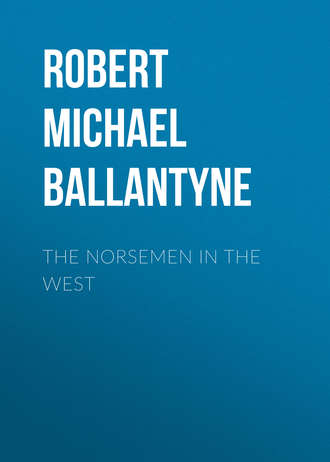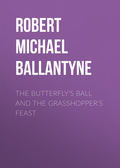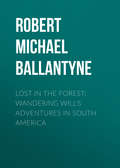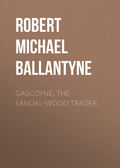
Robert Michael Ballantyne
The Norsemen in the West
Chapter Eight.
A Chapter of Incidents and Exploration, in which a Bear and a Whale Play Prominent Parts
Although arrested thus suddenly and unexpectedly in their progress toward the shore, these resolute Norsemen were not to be balked in their intention of reaching the land that forenoon—for it was morning when the vessel stuck fast on the shallows.
The tide was ebbing at the time, so that Karlsefin knew it would be impossible to get the ship off again until the next flood-tide. He therefore waited till the water was low enough, and then waded to the land accompanied by a large band of men. We need scarcely say that they were well-armed. In those days men never went abroad either by land or sea without their armour, which consisted of swords, axes, spears and bows for offence, with helmets and shields for defence. Some of the men of wealth and position also wore defensive armour on their breasts, thighs, and shins, but most of the fighting men were content to trust to the partial protection afforded by tunics of thick skin.
They were not long of reaching the mouth of the river which Biarne had pointed out, and, after proceeding up its banks for a short distance, were convinced that this must be the very spot they were in search of.
“Now, Biarne,” said Karlsefin, stopping and sitting down on a large stone, “I have no doubt that this is Leif’s river, for it is broad and deep as he told us, therefore we will take our ship up here. Nevertheless, before doing so, it would be a satisfaction to make positively certain that we are in the right way, and this we may do by sending one or two of our men up into the land, who, by following the river, will come to the lake where Leif built his booths, and so bring us back the news of them. Meanwhile we can explore the country here till they return.”
Biarne and Thorward thought this advice good, and both offered to lead the party to be sent there.
“For,” said Thorward, “they may meet with natives, and if the natives here bear any resemblance to the Skraelingers, methinks they won’t receive us with much civility.”
“I have thought of that,” returned Karlsefin with a smile, “but I like not your proposal. What good would it do that either you or Biarne should lead so small a party if ye were assaulted by a hundred or more savages, as might well be the case?”
“Why, we could at all events retreat fighting,” retorted Thorward in a slightly offended tone.
“With fifty, perhaps, in front, to keep you in play, and fifty detached to tickle you in rear.”
Thorward laughed at this, and so did Biarne. “Well, if the worst came to the worst,” said the latter, “we could at any rate sell our lives dearly.”
“And, pray, what good would that do to us?” demanded Karlsefin.
“Well, well, have it your own way, skipper,” said Biarne; “it seems to me, nevertheless, that if we were to advance with the whole of the men we have brought on shore with us, we should be in the same predicament, for twenty men could not easily save themselves from a hundred—or, as it might be, a thousand—if surrounded in the way you speak of.”
“Besides that,” added Thorward, “it seems to me a mean thing to send out only one or two of our men without a leader to cope with such possible dangers, unless indeed they were possessed of more than mortal powers.”
“Why, what has become of your memories, my friends?” exclaimed Karlsefin. “Are there none of our men possessed of powers that are, at all events, more than those of ordinary mortals?”
“O-ho! Hake and Heika! I forgot them,” cried Biarne; “the very men for the work, to be sure!”
“No doubt of it,” said Karlsefin. “If they meet with natives who are friendly, well and good; if they meet with no natives at all,—better. If they meet with unfriendly natives, they can show them their heels; and I warrant you that, unless the natives here be different from most other men, the best pair of savage legs in Vinland will fail to overtake the Scottish brothers.”
Thorward agreed that this was a good plan, but cautioned Karlsefin to give the brothers strict injunctions to fly, and not upon any account to fight; “for,” said he, “these doughty Scots are fiery and fierce when roused, and from what I have seen of them will, I think, be much more disposed to use their legs in running after their foes than in running away from them.”
This having been settled, the brothers were called, and instructed to proceed into the woods and up the bank of the river as quickly as possible, until they should come to a lake on the margin of which they would probably see a few small huts. On discovering these they were to turn immediately and hasten back. They were also particularly cautioned as to their behaviour in the event of meeting with natives, and strictly forbidden to fight, if these should be evil disposed, but to run back at full speed to warn their friends, so that they might be prepared for any emergency.
“Nevertheless,” said Karlsefin, in conclusion, “ye may carry weapons with you if ye will.”
“Thanks,” replied Heika. “As, however, you appear to doubt our powers of self-restraint, we will relieve your mind by going without them.”
Thus instructed and warned, the brothers tightened their belts, and, leaping nimbly into the neighbouring brake, disappeared from view.
“A pair of proper men,” said Karlsefin.—“And now, comrades, we will explore the neighbourhood together, for it is advisable to ascertain all we can of the nature of our new country, and that as quickly as may be. It is needful, also, to do so without scattering, lest we be set upon unexpectedly by any lurking foe. This land is not easily surveyed like Iceland or Greenland, being, as you see, covered with shrubs and trees, which somewhat curtail our vision, and render caution the more necessary.”
While the Norsemen were engaged in examining the woods near the coast, the two Scots held on their way into the interior. There was something absolutely exhilarating, as Krake once remarked, in the mere beholding of these brothers’ movements. They had been famed for agility and endurance even in their own country. They did not run, but trotted lightly, and appeared to be going at a moderate pace, when in reality it would have compelled an ordinary runner to do his best to keep up with them. Yet they did not pant or show any other symptom of distress. On the contrary, they conversed occasionally in quiet tones, as men do when walking. They ran abreast as often as the nature of the ground would allow them to do so, taking their leaps together when they came to small obstructions, such as fallen trees or brooks of a few feet wide; but when they came to creeks of considerable width, the one usually paused to see the other spring over, and then followed him.
Just after having taken a leap of this kind, and while they were running silently side by side along the margin of the river, they heard a crash among the bushes, and next instant a fine deer sprang into an open space in front of them. The brothers bent forward, and, flying like the wind, or like arrows from a bow, followed for a hundred yards or so—then stopped abruptly and burst into a hearty fit of laughter.
“Ah! Heika,” exclaimed the younger, “that fellow would be more than a match for us if we could double our speed. We have no chance with four-legged runners.”
While he was speaking they resumed the jog-trot pace, and soon afterwards came to a rocky ridge, that seemed to traverse the country for some distance. Here they were compelled to walk, and in some places even to clamber, the ground being very rugged.
Here also they came to a small branch or fork of the river that appeared to find its way to the sea through another channel. It was deep, and although narrow in comparison with the parent stream, was much too broad to be leaped over. The pioneers were therefore obliged to swim. Being almost as much at home in the water as otters, they plunged in, clothes and all, without halting, and in a few seconds had gained the other side.
When they reached the top of the ridge they stopped and gazed in silent admiration, for there lay stretched out before them a vast woodland scene of most exquisite beauty. Just at their feet was the lake of which they were in search; some parts of it bright as the blue sky which its unruffled breast reflected; other parts dark almost to blackness with the images of rocks and trees. Everywhere around lay a primeval wilderness of wood and water which it is beyond the power of mortal pen adequately to describe; and while all was suffused with the golden light of an early summer sun, and steeped in the repose of an absolutely calm day, the soft and plaintive cries of innumerable wild-fowl enlivened, without disturbing, the profound tranquillity of the scene.
“Does it not remind you of our own dear land?” said Heika in a low soft voice.
“Ay, like the lowlands on the shores of the Forth fiord,” replied Hake, in the same low tone, as if he feared to break the pleasing stillness; “and there, surely, are the booths we were to search for—see, in the hollow, at the head of yonder bay, with the gravelly beach and the birch-trees hanging from the rocks as if they wished to view themselves in the watery mirror.”
“True—there are three of them visible. Let us descend and examine.”
“Hist! Some one appears to have got there before us,” said Hake, laying his hand on his brother’s shoulder and pointing in the direction of the huts.
“It is not a human visitor, methinks,” observed Heika.
“More like a bear,” returned Hake.
In order to set the question at rest the brothers hastened round by the woods to a spot immediately behind the huts. There was a hill there so steep as to be almost a precipice. It overlooked the shores of the lake immediately below where the huts were, and when the pioneers came to the crest of it and peeped cautiously over, they beheld a large brown bear not far from the hut that stood nearest to the hill, busily engaged in devouring something.
“Now it is a pity,” whispered Heika, “that we brought no arms with us. Truly, little cause have we men to be proud of our strength, for yonder beast could match fifty of us if we had nothing to depend on save our fists and feet and fingers.”
“Why not include the teeth in your list, brother?” asked Hake, with a quiet laugh; “but it is a pity, as you say. What shall—”
He stopped abruptly, for a large boulder, or mass of rock, against which he leaned, gave way under him, made a sudden lurch forward and then stuck fast.
“Ha! a dangerous support,” said Hake, starting back; “but, hist! suppose we shove it down on the bear?”
“A good thought,” replied Heika, “if we can move the mass, which seems doubtful; but let us try. Something may be gained by trying—nothing lost.”
The boulder, which had been so balanced on the edge of the steep hill that a gentle pressure moved it, was a mass of rock weighing several tons, the moving of which would have been a hopeless task for twenty men to attempt, but it stood balanced on the extreme edge of the turn of the hill, and the little slip it had just made rendered its position still more critical; so that, when the young men lay down with their backs against a rock, placed their feet upon it and pushed with all their might, it slowly yielded, toppled over, and rolled with a tremendous surge through a copse which lay immediately below it.
The brothers leaped up and gazed in breathless eagerness to observe the result. The bear, hearing the crash, looked up with as much surprise as the visage of that stupid creature is capable of expressing. The thing was so suddenly done that the bear seemed to have no time to form an opinion or get alarmed, for it stood perfectly still, while the boulder, bounding from the copse, went crashing down the hill, cutting a clear path wherever it touched, attaining terrific velocity, and drawing an immense amount of débris after it. The direction it took happened to be not quite straight for the animal, whose snout it passed within six or eight feet—causing him to shrink back and growl—as it rushed smoking onward over the level bit of sward beneath, through the mass of willows beyond, across the gravelly strand and out to the lake, into which it plunged and disappeared amid a magnificent spout of foam. But the avalanche of earth and stones which its mad descent had created did not let Bruin off so easily. One after another these latter, small and large, went pattering and dashing against him,—some on his flank, some on his ribs, and others on his head. He growled of course, yet stood the fire nobly for a few seconds, but when, at last, a large boulder hit him fairly on the nose, he gave vent to a squeal which terminated in a passionate roar as he turned about and made for the open shore, along which for some distance he ran with the agility of a monstrous wild-cat, and finally leaped out of sight into his forest home!
The brothers looked at each other with sparkling eyes, and next moment the woods resounded with their merriment, as they held their sides and leaned for support against a neighbouring cliff.
Heika was first to recover himself.
“Hold, brother,” he exclaimed, “we laugh loud enough to let Bruin know who it was that injured him, or to bring all the savages in these woods down upon us. Peace, man, peace, and let us return to our friends.”
“As soon as ye please, brother,” said Hake, still laughing as he tightened his belt, “but was it not rare fun to see Bruin stand that stony rain so manfully until his tender point was touched? And then how he ran! ’Twas worth coming here to see a bear leave off his rolling gait so and run like a very wild-cat.—Now I’m ready.”
Without staying to make further examination of Leif’s old huts—for from the place where they stood all the six of them could be clearly seen—the young pioneers started on their return to the coast. They ran back with much greater speed than they had pushed forward—fearing that their companions might be getting impatient or alarmed about them. They did not even converse, but with heads up, chests forward, and elbows bent, addressed themselves to a quick steady run, which soon brought them to the branch of the river previously mentioned. Here they stopped for a moment before plunging in.
“Suppose that we run down its bank,” suggested Hake, “and see whether there be not a shallow crossing.”
“Surely ye have not grown afraid of water, Hake?”
“No, not I, but I should like to see whither this branch trends, and what it is like; besides, the divergence will not cost us much time, as we can cross at any point we have a mind to, and come at the main river again through the woods.”
“Well, I will not balk you—come on.”
They accordingly descended the smaller streams and found it to be broken by various little cascades and rapids, with here and there a longish reach of pebbly ground where the stream widened into a shallow rippling river with one or two small islands in it. At one of these places they crossed where it was only knee-deep in the centre, and finally stopped at the end of a reach, where a sudden narrowing of the banks produced a brawling rapid. Below this there was a deep pool caused by a great eddy.
“Now, we go no further,” said Heika. “Here we shall cross through the woods to the main branch.”
“’Tis a pretty stream,” observed Hake when they were about to leave it.
As he spoke a large salmon leaped high out of the pool below, flashed for one moment in the sunshine like a bar of living silver, and fell back into the water with a sounding splash. Hake caught his breath and opened wide his eyes!
“Truly that is a good sight to the eyes of a Scotsman,” said Heika, gazing with interest at the place where the fish had disappeared; “it reminds me of my native land.”
“Ay, and me of my dinner,” observed Hake, smacking his lips.
“Out upon thee, man!” cried Heika, “how can ye couple our native land with such a matter-o’-fact thought as dinner?”
“Why, it would be hard to uncouple the thought of dinner from our native land,” returned Hake, with a laugh, as they entered the forest; “for every man—not to mention woman—within its circling coast-line is a diner, and so by hook or crook must daily have his dinner.—But say, brother, is it not matter of satisfaction, as well as matter of fact, that the waters of this Vinland shall provide us with abundance of food not less surely than the land? If things go on as they have begun I shall be well content to stay here.”
“Ye do not deserve the name of Scot, Hake,” said the other gravely. “My heart is in Scotland; it is not here.”
“True, I know it,” replied Hake, with a touch of feeling; “in a double sense, too, for your betrothed is there. Nevertheless, as I did not leave my heart behind me; surely there is no sin in taking some pleasure in this new land. But heed not my idle talk, brother. You and I shall yet live to see the bonny hills of—. Ha! here we are on the big stream once more, sooner than I had expected, and, if I mistake not, within hail of our comrades.”
Hake was right. The moment they emerged from the woods upon the open bank of the large river they saw a party of men in the distance approaching them, and, an instant later, a loud halloo assured them that these were their friends.
When the pioneers had related all that they had seen and done, the whole party returned to the shore and hailed the ship, for, the tide having risen, they could not now reach it by wading. A boat was immediately sent for them, and great was the interest manifested by all on board to learn the news of Vinland. They had time to give an account of all that had been done and seen, because it still wanted an hour of flood-tide, and the ship still lay immoveable.
While they were thus engaged, Gudrid happened to cast her eyes over the stern of the ship, and thought she saw an object moving in the water.
“What is that I see?” she said, pointing towards it.
“The great sea-serpent!” exclaimed Biarne, shading his eyes with his hand.
“Or his ghost,” remarked Krake.
From which observations, coupled together, it would appear that the famous monster referred to was known by repute to the Norsemen of the eleventh century, though he was to some extent regarded as a myth!
Be this as it may, the object which now attracted the attention and raised the eyebrows of all on board the “Snake” evidently possessed life, for it was very active—wildly so—besides being large. It darted hither and thither, apparently without aim, sending the water in curling foam before it. Suddenly it made straight for the ship, then it turned at a tangent and made for the island; anon it wheeled round, and rushed, like a mad creature, to the shore.
Then arose a deafening shout from the men—
“A whale! an embayed whale!”
And so in fact it was; a large whale, which, as whales will sometimes do—blind ones, perhaps—had lost its way, got entangled among the sandbanks lying between the island and the shore, and was now making frantic efforts to escape.
Need we say that a scene of the wildest excitement ensued among the men! The two boats—one of which was, as we have said, a large one—were got ready, barbed spears and lances and ropes were thrown into them, as many men as they could hold with safety jumped in, and pulled away, might and main, after the terrified whale.
You may be sure, reader, that little Olaf was there, fast by the side of his friend and hero Karlsefin, who took charge of the large boat, with Thorward in the bow to direct him how to steer. Biarne was there too as a matter of course, in charge of the little boat, with Krake as his bowman and Tyrker pulling the stroke-oar. For Tyrker was strong, though little, ugly, and old, and had a peculiar talent for getting involved in any fighting, fun, or mischief that chanced to be in hand. Men said that he was afraid of dying in his bed, and had made up his mind to rush continually into the jaws of danger until they should close upon and crush him; but we are of opinion that this was a calumny. Those of the men who were necessarily left in the ship could scarce be prevented from swimming after the boats as they shot away, and nothing but the certainty of being drowned restrained them from making the mad attempt. As it was, they clambered upon the figure-head and up the rigging, where, with gaping mouths and staring eyes, they watched the movements of their more fortunate companions.
Meanwhile the whale had made what appeared to be a grand and final neck-or-nothing rush in the direction of the shore. Of course he was high, although not dry, in a few seconds. That is to say, he got into water so shallow that he stuck fast, with his great head and shoulders raised considerably out of the sea, in which position he began to roll, heave, spout, and lash his mighty tail with a degree of violence that almost approached sublimity.
He was in these circumstances when the Norsemen came up; for though too shallow for the whale, the water was quite deep enough for the boats.
Being light, the small boat reached the scene of action first. Krake stood up in the bow to be ready. He held in his hand a curious wooden spear with a loose barb tipped with the tusk of a walrus. It had been procured from one of the Greenland Skraelingers. A rope was attached to it.
As they drew near, the whale stopped for an instant, probably to recover breath. Krake raised his spear—the fish raised his tail. Whizz! went the spear. Down came the tail with a thunderclap, and next moment mud, sand, water, stones, foam, and blood, were flying in cataracts everywhere as the monster renewed its struggles.
“Back! back oars!” shouted Biarne, as they were almost swamped by the flood.
The men obeyed with such good-will that Krake was thrown head-foremost over the bow.
“Hold fast!” yelled Krake on coming to the surface.
“If ye had held fast ye wouldn’t have been there,” said Biarne; “where are ye?”
He rose again out of the foam, yelled, and tossed up his arms.
“Can the man not swim?” cried Biarne, in alarm; “pull, boys, pull!”
The men were already pulling with such force that they almost went over the man. As they rubbed past him Hake dropped his oar and caught him by the hair, Biarne leaned over the side and got him by the breeches, and with a vigorous heave they had him inboard.
“Why, Krake, I thought you could swim!” said Biarne.
“Ay, so I can, but who could swim with a coil of rope round his neck and legs?”
The poor man had indeed been entangled in the rope of the spear, so that he could not use his limbs freely.
No more was said, however, for they were still in dangerous proximity to the tail of the struggling fish, and had to pull out of its way.
Meanwhile the large boat, profiting by the experience of the small one, had kept more towards the whale’s head, and, before Krake had been rescued, Thorward sent a Skraelinger spear deep into its shoulder. But this only acted as a spur to the huge creature, and made it heave about with such violence that it managed to slew right round with its head offshore.
At this the men could not restrain a shout of alarm, for they knew that if the whale were to succeed in struggling again into water where it could swim, it would carry away spears and ropes; or, in the event of these holding on, would infallibly capsize and sink the boats.
“Come, drive in your spears!” shouted Karlsefin in a voice of thunder, for his usually quiet spirit was now deeply stirred.
Thorward and one of the men threw their spears, but the latter missed and the former struck his weapon into a part that was too thick to do much injury, though it was delivered with great force and went deep.
“This will never do!” cried Karlsefin, leaping up; “here, Swend, take the helm. Ho! hand me that spear, quick! Now, lads, pull, pull, with heart and limb!”
As he spoke he sprang like a roused giant into the bow of the boat and caught up a spear. The men obeyed his orders. The boat rushed against the whale’s side, and, with its impetus added to his own Herculean strength, Karlsefin thrust the spear deep down into the monster’s body just behind the shoulder fin.
The crimson stream that immediately gushed forth besprinkled all in the boat and dyed the sea around.
“That is his life-blood,” said Karlsefin, with a grim smile; “you may back off now, lads.”
This was done at once. The small boat was also ordered to back off, and those in it obeyed not a moment too soon, for immediately after receiving the deadly wound the whale went into a violent dying struggle. It soon subsided. There were one or two mighty heavings of the shoulder; then a shudder ran through the huge carcase, and it rolled slowly over in a relaxed manner which told significantly that the great mysterious life had fled.







